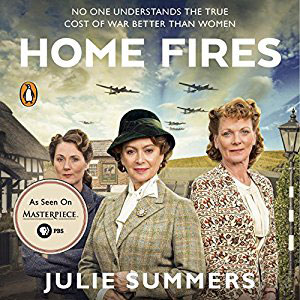Last Updated on May 3, 2017
Home Fires tells the story of a rural English town on the verge of World War II. As two powerful women struggle to put aside their differences in The Women’s Institute, a community learns to unite amidst the chaos and uncertainty of wartime. Samantha Bond (Downton Abbey) and Francesca Annis (Reckless, Cranford) star in this heartwarming story of courage, friendship, and holding onto light in our darkest moments.
The Final Season of Home Fires follows the village when conflict takes hold. As the separation from their husbands, fathers, sons and brothers becomes more painful, the women rely on one another and the friendships forged through village life. It will take calm, fortitude, and creativity to bring the diverse women of the village together, and to help the community survive what is to come.
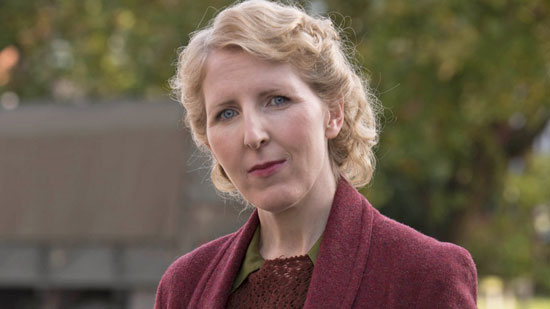
In the fourth episode of this season: The Campbells get good news, Joyce unexpectedly joins forces with Erica, Alison may be in over hear head, and the Brindsleys’ happiness is marred by a disturbing discovery. Can Teresa throw off her old life for a chance at a sort of happiness?

Each week, Jambusters / Home Fires author Julie Summers will introduce us to the coming episode of Home Fires. Here she shares some historical context that will be helpful to have before you watch the period drama’s fourth episode of the second season, airing Sunday, April 23rd, 2017 at 9 on PBS MASTERPIECE.
No spoilers, she promises, just some background detail to add to the enjoyment of the series.
You can check back on Willow and Thatch for each installment, or sign up for the newsletter now.
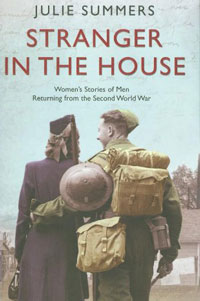 If you haven’t already read about the characters and a wide historical background for this entire season, you can do that now here.
If you haven’t already read about the characters and a wide historical background for this entire season, you can do that now here.
When you are finished reading this, you may want to see the interview with Julie where she discusses how her knowledge was used in the scripts. The first section of the history behind episode 4 from Julie Summers (below) is an abridged version of a chapter in her book Stranger in the House, entitled Sex and Love in Times of War.
“This book deals with the women’s side of the story. It is a collection of reminiscences about life in the immediate aftermath of the war and of the long term consequences of readjustment. There are interviews with wives, widows, sisters, daughters and granddaughters. I have also used archive material to flesh out the mothers’ side of the story as well as the historical context. This was a period when rationing was still rife – it got worse after the war, not better – when only a tiny percentage of women had vacuum cleaners and many had no running water in the kitchen. Washing was done on a Monday and dusting daily. Single mothers were stigmatised and most illegitimate children were adopted.” – Julie Summers
You can read the history behind each episode of Season 2 here: episode 1, episode 2, episode 3.
You can order Season 2 of Home Fires on DVD here.

Love and Sex in Times of War
‘If you put men and women together in close proximity in a danger shared, a mutual attraction is not only the inevitable result, it is what we should expect, and we should be very surprised and perturbed from a national point of view if it wasn’t.’ Thus wrote the English novelist, Barbara Cartland in 1945. As a welfare officer for the women’s services during the Second World War she was warm, generous and young people responded to her: ‘No one has ever minded when I have talked to them, and I’ve been both personal and intrusive. Being a novelist helps. I don’t know why, but people always want to confide in novelists, and the other thing which I believe makes everything alright is the fact that I am sincere. I do believe what I say.’ There were those in society who judged young people who got into trouble and condemned them but Cartland thought that was unfair and wrong. They were young, in love, in danger and in a hurry.
From today’s perspective it is difficult to imagine or understand the stigma caused by extramarital affairs or illegitimate children. For both men and women during the war there was a sense that living for today was fine because tomorrow you might die and this spilled over into behaviour which to some seemed reprehensible but which to others was inevitable and not even particularly surprising. ‘War Aphrodisia’ was traditionally ascribed to men in battle and was a well-recognised condition. In total war, as the Second World War undoubtedly was for Britain and mainland Europe, a hedonistic impulse reached many other segments of society.
The emancipation of women in Britain after the First World War had led, briefly, to a more liberated attitude towards fashion and behaviour. One commentator wrote: ‘Women bobbed their hair, donned short skirts, smoked in public and wore the heavy makeup which had formerly been the attribute of the harlot.’ The seeds of emancipation had been sown and the flame was fanned hardest in the USA where the combination of a buoyant stock market, bootleg gin and the racy novels of F. Scott Fitzgerald fuelled the frenetic pace of the social revolution. Hollywood played its part, producing erotic films for a mass audience and elevating the leading stars to almost legendary status.
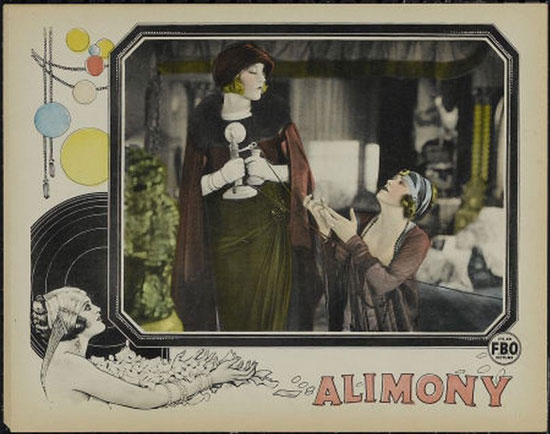
Audiences flocked to films such as Alimony (1917), which promised ‘brilliant men, beautiful jazz babies, champagne baths, midnight revels, petting parties in the purple dawn, all ending in one terrifying climax that makes you gasp.’ The Great Depression put a stop to much of this and divorce rates in Britain plunged along with the stock market, reaching a low in 1933, down 40% from the 1928 level. The number of weddings also fell.
The circumstances of total war changed both attitudes and opportunities: ‘We were not really immoral, there was a war on,’ explained one British housewife. The ‘what the heck I could be dead tomorrow’ attitude of some of the fighter pilots, for example, brought many couples together and hastily arranged marriages, with often only forty-eight hours to spend together, were not uncommon. Few couples could consider what would happen after the war, when life might return to normal. They lived for that day and perhaps the next. ‘They were loved and beloved, and by this stage in the war love was about the only thing left unrationed.’
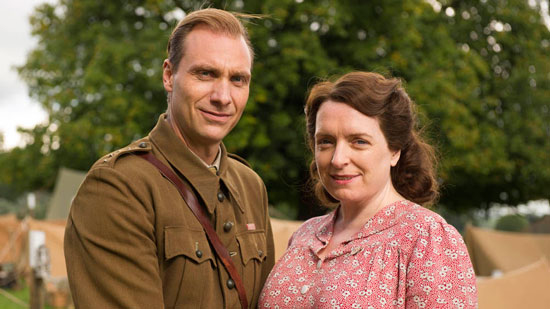
As we dig deeper into the fourth episode of HOME FIRES, war aphrodisia has reached Great Paxford. Electric tensions spark and shock around the village in the ferment of high drama. Pat’s nascent relationship with Marek has caused gasps and quickening heartbeats not just for careful observers like Erica, but for the rest of us watching on, agonising over her every move, desperate for her to duck and dive to avoid the eagle eye of Bob. How can she be so brave as to carry on her relationship with Marek while her deeply troubled husband is trying to exert his influence over her? A contemporary description from a Manchester housewife in 1944 might throw some light on this: ‘There was nothing cheap about our affair, and if Rick had my body, my heart was with my husband and somehow I didn’t feel that I was doing anything wrong.’
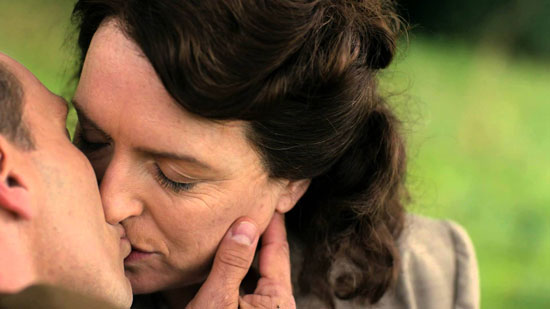
Other relationships stop and start. Emotions that would normally have been ignored or suppressed, rise to the surface with a juvenile and intoxicating urgency. Some women find themselves almost out of their depth and exert a rigorous check on their emotions. Thanks to an intervention by Joyce Cameron in the last episode, Sarah Collingbourne is brought to an abrupt halt in her dalliance with the delightful, handsome and oh-so-eligible Wing Commander from RAF Tabley Wood. But what of Miss Fenchurch? She might have danced with him at the Czech Camp but is there a chance of something in the future? Is Laura Campbell’s reputation going to blot out the early signs of love with Tom, the handsome young pilot who nobly stands up to the prissy but not-above-buying-black market-butter, Mrs Talbot? This fetid atmosphere of possibility belongs, of course, in a 9pm drama in 2016, but it accurately reflects the intoxicating atmosphere of the summer of 1940 when no-one knew what might happen next. The Second World War had entered a phase of unprecedented high stakes and it is not surprising that people reacted to it by questioning their tomorrow.
I am constantly excited and delighted by Simon Block’s brilliantly observed scripts. He has succeeded in chiming with the changing times. The pace of this series increases as the pace of the war did too. We never quite know what turn is to come next but when it comes it is both thrilling and fitting. Robert Quinn’s outstanding directing never lets us rest for a minute, yet it is not hurried. We are on the edge of our seats, as the country was in 1940. Home Fires is an all-round production with an exceptional cast, a superb production team and an energetic editorial and post-production set up that weaves the magic together as Samuel Sims’ music sprinkles the icing on the cake.
Enjoy Sunday 23 April. It is a mesmerising episode. – Julie Summers
 Each installment in this series of the history behind each upcoming episode will be on Willow and Thatch the Friday before the episode airs.
Each installment in this series of the history behind each upcoming episode will be on Willow and Thatch the Friday before the episode airs.
Watch each of the 6 episodes of the much-anticipated final season of this beloved series on Sundays, April 2nd – May 7th, 2017 at 9/8c on MASTERPIECE.
Need to catch up? Season 1 is available to stream for free with Amazon Prime. If you don’t already have Prime, you can get a free trial here.
The period drama Home Fires is created and written by Simon Block and inspired by Julie Summers’ book Home Fires which tells the true story of the WI on the home front from 1939-1945.
The Audible version of Home Fires: The Story of the Women’s Institute in the Second World War is free with an Audible trial. Get it here.

 About the book Home Fires: Away from the frontlines of World War II, in towns and villages across Great Britain, ordinary women were playing a vital role in their country’s war effort. As members of the Women’s Institute, an organization with a presence in a third of Britain’s villages, they ran canteens and knitted garments for troops, collected tons of rosehips and other herbs to replace medicines that couldn’t be imported, and advised the government on issues ranging from evacuee housing to children’s health to postwar reconstruction. But they are best known for making jam: from produce they grew on every available scrap of land, they produced twelve million pounds of jam and preserves to feed a hungry nation.
About the book Home Fires: Away from the frontlines of World War II, in towns and villages across Great Britain, ordinary women were playing a vital role in their country’s war effort. As members of the Women’s Institute, an organization with a presence in a third of Britain’s villages, they ran canteens and knitted garments for troops, collected tons of rosehips and other herbs to replace medicines that couldn’t be imported, and advised the government on issues ranging from evacuee housing to children’s health to postwar reconstruction. But they are best known for making jam: from produce they grew on every available scrap of land, they produced twelve million pounds of jam and preserves to feed a hungry nation.
Home Fires, Julie Summers’s fascinating social history of the Women’s Institute during the war (when its members included the future Queen Elizabeth II along with her mother and grandmother), provides the remarkable and inspiring true story behind the upcoming PBS Masterpiece series that will be sure to delight fans of Call the Midwife and Foyle’s War. Through archival material and interviews with current and former Women’s Institute members, Home Fires gives us an intimate look at life on the home front during World War II.
Julie Summers has written six books about the Second World War era including Stranger in the House: Women’s Stories of Men Returning from the Second World War, and When the Children Came Home: Stories of Wartime Evacuees.
Home Fires is available on DVD: The Masterpiece PBS mini-series follows a group of inspirational women in a rural Cheshire community with the shadow of World War II casting a dark cloud over their lives. The isolated village couldn’t feel further away from the impending bloodshed and battlefields and yet it is not immune from the effects of war. As the conflict takes hold, and separates the women from their husbands, fathers, sons and brothers, the characters find themselves under increasing and extraordinary pressures in a rapidly fragmenting world. By banding together as the Great Paxford Women’s Institute, they will help maintain the nation’s fabric in its darkest hour, and discover inner resources that will change their lives forever.
In the second season, Great Paxford’s eclectic band of women return for more stories from the home front as they deal with imminent threat during the Battle of Britain. As the nation finds itself increasingly beleaguered, relationships, friendships, and loyalties within the community will be tested as never before. The women find they must heighten their efforts to boost morale amidst the chaos and uncertainty enveloping the village.
You can order Season 2 of Home Fires on DVD here.

 Photo Barker Evans
Photo Barker EvansAbout Julie Summers: I was born near Liverpool and grew up first on the Wirral and then in Cheshire. Although the greater part of my childhood was spent outside pursuing any number of outdoor activities, I have always wanted to be a writer. For the first twenty years of life after university I worked in the art world but was drawn inexorably towards writing. Finally, in 2004, I gave up my job and began writing full-time. It was the best decision I have made in my career. I am passionate about writing and unembarrassed to be so. I love researching my books, especially when they involve meeting people and talking to them about their lives.
People often ask me why I am so fascinated by the Second World War. My answer is that it is not war that interests me but the way people coped. In extreme situations such as war or mountaineering ordinary people find extraordinary strength and courage. That is what I enjoy learning about.
I have a little study in the attic of our house with one of the best views in Oxford – the dreaming spires seen from Iffley. I write in the mornings and find the problem is not sticking to the routine but tearing myself away from writing at the end of the day. My companions are two Border Terriers who keep me entertained and fit. They sleep in two old wine boxes under the window in my office.
I describe myself as a biographer and historian but the most important thing for me is to be a story-teller.

If you enjoyed this post you’ll want to wander over to the Period Films List – the best costume and historical period dramas, romantic period movies, all sorted by era and theme. And be sure to see 7 Reasons to Watch Kurt Seyit and Sura – a First World War romantic historical television series now streaming.


